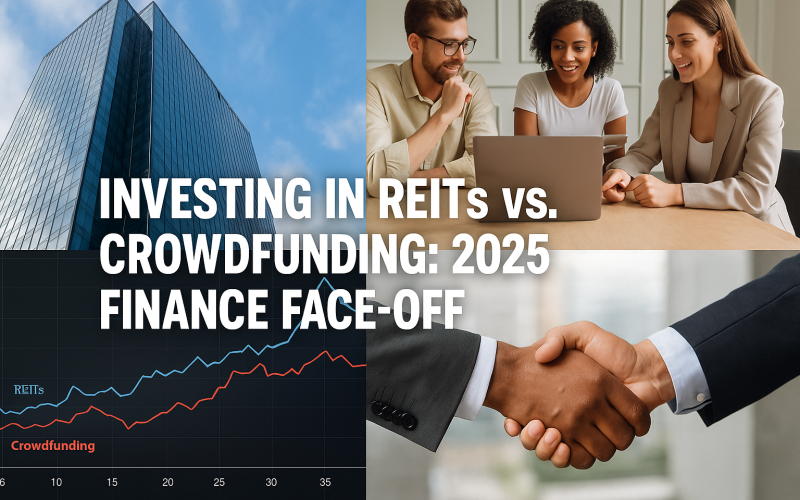Introduction
Investing in real estate offers steady income and long-term growth. In 2025, two popular paths stand out: Real Estate Investment Trusts (REITs) and real estate crowdfunding. Both let you own property without buying a house or managing tenants. But they work in very different ways. REITs trade on stock markets like stocks and offer instant liquidity. Crowdfunding platforms pool money from many investors to fund specific deals, often with higher returns but less liquidity. Choosing between these options matters for your goals, risk comfort, and timeline. In this guide, we compare REITs and crowdfunding across key factors: accessibility, returns, liquidity, fees, risk, and tax treatment. You will get clear insights and a comparison table to help you decide where to put your money in 2025.
What Are REITs?
REITs are companies that own or finance income-producing real estate. They include apartments, offices, shopping centers, and even cell towers. By law, REITs must pay at least 90 percent of taxable income as dividends. This makes them popular for income-seekers.
How REITs Work
You buy shares of a REIT on a stock exchange. The price moves with market demand. The REIT uses investor money to purchase properties or mortgages. It rents or holds those assets, collects rent or loan interest, and passes most of the cash back to you as dividends. You earn money from share price changes and dividend payments.
Types of REITs
Equity REITs own properties and earn rent. Mortgage REITs lend money to property owners and collect interest. Hybrid REITs do both. Equity REITs share in rising real estate values, while mortgage REITs offer higher yields but more rate risk, since interest income falls when rates rise.
What Is Real Estate Crowdfunding?

Real estate crowdfunding gathers small investments from many people to fund property deals. Platforms like Fundrise, RealtyMogul, and CrowdStreet host offerings. Investors pick specific projects or funds and commit capital for a set term, often three to ten years.
How Crowdfunding Works
Platforms vet sponsors who manage property acquisition, renovation, and leasing. You browse deals, review projected returns and risks, and invest a minimum amount—sometimes $500. The sponsor handles property tasks. You earn from rental income and the eventual sale. Crowdfunding deals can be equity (ownership share) or debt (loan with fixed interest).
Types of Crowdfunding
Equity crowdfunding gives you an ownership stake. You share in profits and losses. Debt crowdfunding pays fixed interest but no ownership. Debt deals have priority in payment, making them lower risk than equity. Some platforms also offer preferred equity, blending traits of both.
Key Comparison Factors

To choose between REITs and crowdfunding, compare accessibility, returns, liquidity, fees, risk, and tax treatment.
Accessibility and Minimum Investment
REITs trade like stocks, so you can invest with a few dollars. Any brokerage account works. Crowdfunding often requires accreditation or a $500–$5,000 minimum. Some platforms now accept smaller amounts for non-accredited investors, but choices remain limited compared to public REITs.
Expected Returns
REIT dividends average 3–5 percent per year, with total returns around 7–9 percent historically. Crowdfunding deals project 8–15 percent returns, depending on sponsor skill and deal type. Higher return potential comes with higher risk and less certainty. Always review sponsor track records and local market conditions.
Liquidity and Holding Period
REIT shares you sell any trading day. Market swings may lower share price, but you can exit easily. Crowdfunding locks your money for the project term. Early exits often incur fees or require secondary market buyers, which can be scarce. If you need ready cash, REITs win. For long-term investors, crowdfunding fits better.
Fees and Expenses
REITs have expense ratios—annual operating fees around 0.5–1.5 percent of assets. Brokerage commissions may apply. Crowdfunding platforms charge acquisition fees (1–3 percent) and annual asset management fees (1–2 percent). Sponsors may also take a share of profits, called a promote or carried interest, usually 20 percent above a hurdle rate. Total crowdfunding fees often exceed REIT expenses, so factor that into net returns.
Risk Profile
REITs diversify across many properties and markets, reducing single-asset risk. They still face market cycles, interest rate spikes, and sector downturns. Crowdfunding deals focus on specific projects, so a single vacancy or cost overrun can hit returns hard. Project due diligence and sponsor experience are vital to manage crowdfunding risk.
Tax Treatment
REIT dividends are taxed as ordinary income, which can be up to 37 percent in the U.S. Crowdfunding income varies: equity dividends may qualify for capital gains rates if held long enough, while debt interest is taxed as ordinary income. Many platforms issue K-1 forms, complicating filings. REITs often provide a 1099-DIV, simpler for taxes.
Table: REITs vs. Crowdfunding Comparison
| Factor | REITs | Crowdfunding |
|---|---|---|
| Minimum Investment | Low ($5–$10) | Medium to High ($500–$5,000+) |
| Returns | 7–9% historical | 8–15% projected |
| Liquidity | High (public market) | Low (locked term) |
| Fees | 0.5–1.5% expense ratio | 1–3% acquisition + 1–2% management |
| Risk | Diversified property portfolio | Single-project concentration |
| Taxation | Ordinary income | Mixed (cap gains, interest) |
Best Practices for Investors

Regardless of path, follow these tips to invest wisely.
Do Your Research
For REITs, analyze funds with solid records, low fees, and clear sector focus. For crowdfunding, check sponsor track records, deal memos, and local market trends. Read platform reviews and regulatory disclosures.
Diversify Across Strategies
You need not choose one or the other. Allocate a portion to public REITs for liquidity and diversification, and a portion to crowdfunding for higher yield potential. A balanced mix smooths returns.
Understand Lockup Periods
Crowdfunding terms vary. Know how long your cash remains locked. Factor in personal goals—home purchase, education costs, retirement—to ensure funds are available when needed.
Account for Fees and Taxes
Calculate net returns after fees and taxes. Use after-tax yield to compare options fairly. Seek tax advice if your holdings include complex K-1 forms or international properties.
Monitor Your Investments
Check REIT performance quarterly and read annual reports. Crowdfunding platforms often send quarterly updates and annual appraisals. Stay informed on property performance, occupancy rates, and market shifts.
Future Trends in 2025

As we move through 2025, both markets evolve.
Fractional Public REIT Shares
Platforms now offer fractional shares of non-traded REITs. This creates hybrid liquidity for private deals, blurring lines between public and private real estate.
Themed Crowdfunding Funds
Niche funds for data centers, life sciences campuses, or sustainable buildings attract targeted investors. These funds pool many deals to diversify risk within crowdfunding.
Tokenization of Real Estate
Blockchain tokens grant small-scale ownership in properties, traded 24/7 on digital exchanges. Tokenization promises instant settlement and lower minimums, merging traits of REITs and crowdfunding.
Conclusion
Both REITs and real estate crowdfunding offer paths to real estate exposure without direct property management. REITs shine with low minimums, high liquidity, and broad diversification. Crowdfunding can deliver higher, deal-specific returns but with longer lockups and higher fees. In 2025, blending both approaches tailors risk and reward for investors. Research carefully, diversify across vehicles, and plan around fees and taxes. As fractional REITs and token platforms emerge, investors have even more ways to access real estate wealth. Choose the mix that fits your goals, timeline, and comfort with liquidity. With smart planning, you can harness the power of real estate to grow and protect your wealth.
Call-to-Action
Ready to invest in real estate? Explore top REITs on your brokerage platform and browse crowdfunding deals on leading services today. Start building a balanced real estate portfolio now!











